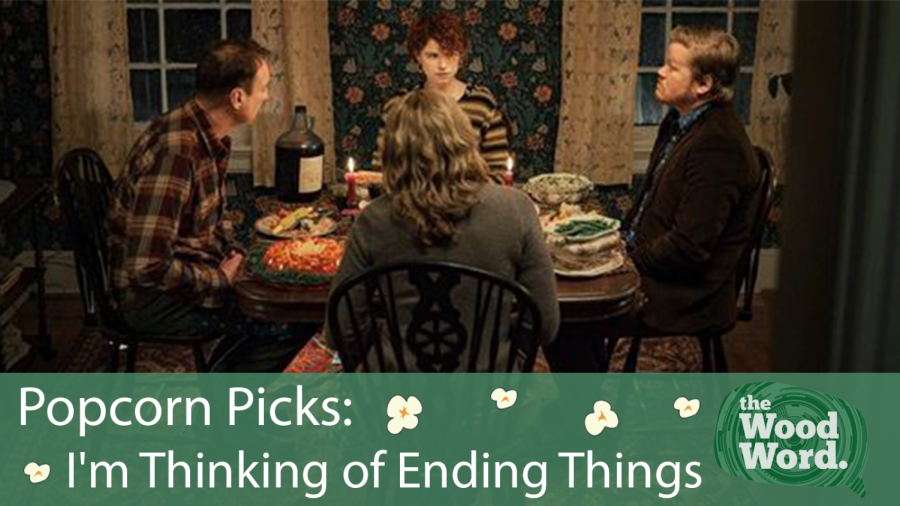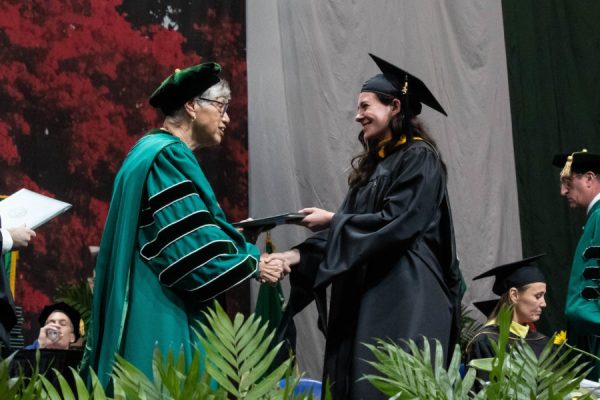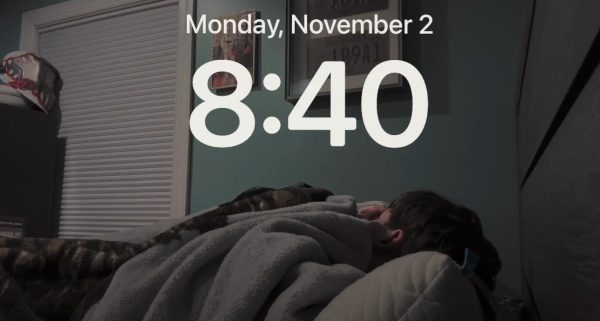Popcorn Picks Review: Netflix’s “I’m Thinking of Ending Things” is confusing yet compelling
Photo credit/ Autumn Bohner
Charlie Kaufman introduces us to the inner turmoil of a person’s mind in “I’m Thinking of Ending Things.”
October 15, 2020
Every year, several films come out that attempt to challenge viewers and their interpretations of the world.
One such film is “I’m Thinking of Ending Things,” the latest directorial production from Charlie Kaufman, who previously worked on such titles as “Being John Malkovich” and “Eternal Sunshine of the Spotless Mind.”
The plot follows a young woman (who is not explicitly named), portrayed by Jessie Buckley, and her boyfriend, Jake, portrayed by Jesse Plemons, as they go on a road trip to visit his parents’ farm. However, as the film progresses, an abundance of strange phenomena occurs, which causes the young woman to lose touch with reality and question life as she knows it.
Kaufman’s adaptation of Iain Reid’s novel of the same name presents a world wherein the universal message requires a colossal amount of concentration to unpack, yet ultimately the film ends up being truthful to its source material.
When Netflix released the first trailer in early August, I was curious to examine how the director would lead the characters through this world where everything is not as it seems.
After viewing it for the first time with a group of friends, I was unbelievably bewildered. Although some parts were straight forward and comprehensible, the majority of the film was difficult to decrypt due to its nonlinear nature and the inclusion of incredibly intricate language and excessive usage of literary devices. It became such a struggle to comprehend at times that my friends and I ended up theorizing what was truly going on, which may have been Kaufman’s intention with this adaptation.
Even though I was unable to digest everything I saw, I still noticed the abundance of meaningful content the adaptation offered me to dissect. That led me to deeply reflect upon what I had just seen and how it made me feel until I was able to gain a comprehensive interpretation that strongly ties in with the themes of regret, false hope and loneliness conveyed throughout.
This element that was most significant to this analysis was the film’s perpetual usage of symbolism, primarily the people and media that are a part of Jake’s life. I found these symbols to represent what could have allowed him to become the person he aspired to be instead of the person he forced himself into being by not correcting his mistakes when he had the chance.
One part that was grueling to decipher was why Jake calls his girlfriend by numerous names throughout the runtime and never settles on a definite title for her. After thinking for longer than I would like to admit, I have concluded that this detail is symbolic in regards to how his girlfriend does not exist and manifests herself from his lonely and regretful conscience. This interpretation generally makes sense within the context of the film, especially after seeing how Kaufman attributed the role of “Young Woman” to Buckley in the credits.
With this additional insight in mind, I viewed the film for a second time with a different group of friends.
Running through everything once again made it clear how every scene is overflowing with detail, to the point it can get exhausting even contemplating how much time and consideration Kaufman must have put into writing the script, among other production components.
The sequences that stood out to me the most were those with the couple talking in their car while driving, which astonishingly encapsulates nearly two-thirds of the runtime.
In my first viewing, these scenes overwhelmed me as they came off as highly repetitive and confined due to the cinematography of Łukasz Żal, who has worked on such Academy Award-nominated films as “Loving Vincent” and “Cold War.”
Upon my second viewing, I recognized how that’s precisely how Kaufman wants the viewer to feel during these sections. The conversations that take place in this car initially appear at first to be dense and unclear, with these feelings underscored by Żal’s unique yet repetitive composition of shots. However, as one pays close attention as the plot plays out, I believe they gradually reveal themselves as the essence of the film as a whole.
This second attempt also thankfully cleared up a majority of the confusion I faced the first time through, especially regarding the ideologies of aging and evolution that both contribute to the part of the plot involving Jake’s parents.
During these scenes, his mother and father, portrayed by Toni Collette and David Thewlis, provide a thorough characterization of their son by converting into past and future renditions of themselves, á la the ghosts of Christmas’ past, present and future but a lot more convoluted and outlandish.
These segments with Collette and Thewlis also add to the overall atmosphere and emotion as they include a discomforting amount of silence, which, in addition to their body language, ends up speaking louder than the concise dialogue.
In conclusion, the beauty behind “I’m Thinking of Ending Things” is that it becomes a psychological cataclysm of how time is a terrifying continuum no one should take for granted — something everyone can relate to.
While some viewers may feel intimidated by the film’s immense detail, to the extent that they would rather turn it off and watch something, those who keep watching until the end and maintain an open-minded mentality will not regret their decision.
I stress how it is vital to watch at least twice, not only so viewers can thoroughly comprehend the plot and symbolism but also so they can admire the dedication Kaufman made to ensuring its cohesion and cinematic satisfaction.
Seeing as how it emphasizes the way the media shapes one’s being, this psychological drama might make you rethink for better or worse every move you have ever made.
Final rating: 3 out of 4 kernels
Contact the writer: [email protected]
Twitter: @MKelleyWW
















